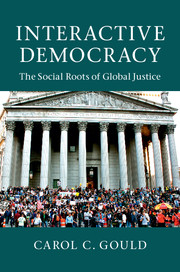Book contents
- Frontmatter
- Dedication
- Contents
- Acknowledgements
- Introduction
- Part I A theoretical framework
- Part II The social roots of global justice
- 5 Transnational solidarities
- 6 Does global justice presuppose global solidarity?
- 7 Recognition and care in global justice
- 8 Gender equality, culture, and the interpretation of human rights
- 9 The sociality of free speech: the case of humor across cultures
- 10 Violence, power-with, and the human right to democracy
- Part III Interactive democracy – transnational, regional, global
- Works cited
- Index
- References
8 - Gender equality, culture, and the interpretation of human rights
Published online by Cambridge University Press: 05 September 2014
- Frontmatter
- Dedication
- Contents
- Acknowledgements
- Introduction
- Part I A theoretical framework
- Part II The social roots of global justice
- 5 Transnational solidarities
- 6 Does global justice presuppose global solidarity?
- 7 Recognition and care in global justice
- 8 Gender equality, culture, and the interpretation of human rights
- 9 The sociality of free speech: the case of humor across cultures
- 10 Violence, power-with, and the human right to democracy
- Part III Interactive democracy – transnational, regional, global
- Works cited
- Index
- References
Summary
Introduction
In a provocative article for the journal Foreign Policy some years ago, Ronald Inglehart and Pippa Norris argued that the true “clash of civilizations” between the Muslim world and the West does not concern the status of democracy, as Huntington and others supposed, but rather attitudes toward gender equality, divorce, abortion, gay rights, and so on. On the basis of surveys of values in these different cultural contexts, Inglehart and Norris concluded that there is wide agreement among Muslim and Western populations on the value of democracy. But such agreement is very much missing in regard to women’s equality or what they call other “self-expressive” values such as tolerance for a variety of sexual lifestyles.
In fact, the analysis that these authors offer poses troubling issues of research methodology, especially concerning how these culturally defined values are interpreted and more generally constructed, and how the various terms such as equality are used. But I am not concerned here with disputing their empirical results. Rather, granting that there remain significant differences in the valuation of women’s equality and the perception of appropriate gender roles and identities in diverse cultural contexts, I want to consider the normative attitude that one can take to these differences, in light of a commitment to the value of women’s equality.
- Type
- Chapter
- Information
- Interactive DemocracyThe Social Roots of Global Justice, pp. 148 - 163Publisher: Cambridge University PressPrint publication year: 2014

